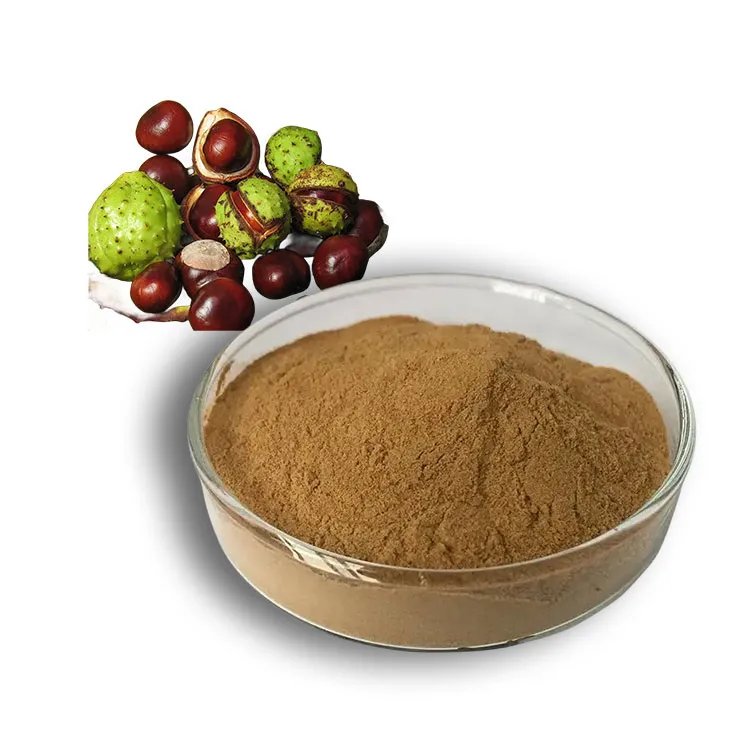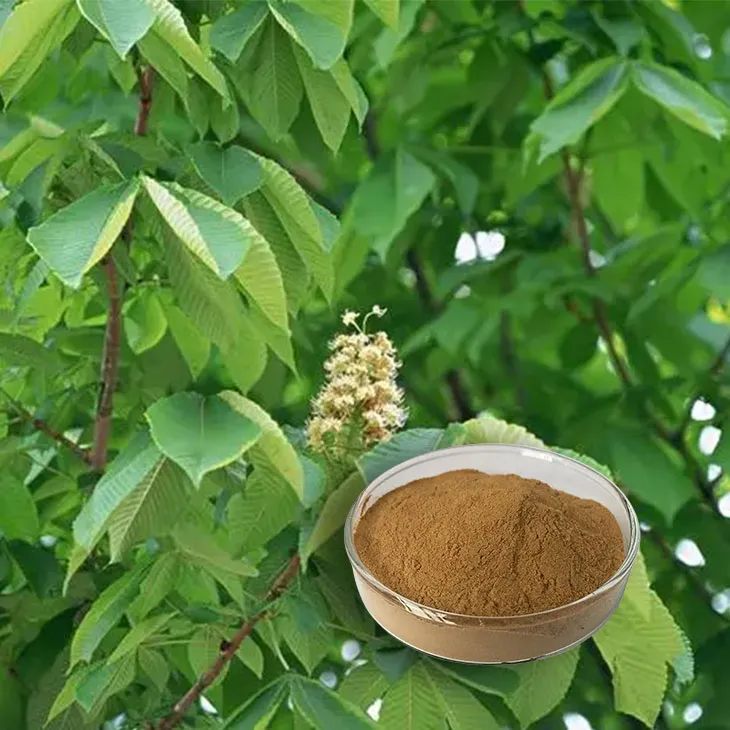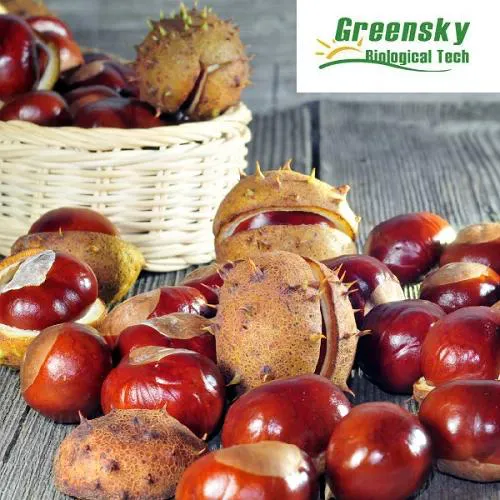- 0086-571-85302990
- sales@greenskybio.com
Uncover the Secret: 8 Reasons Why Horse Chestnut Extract You Must Know.
2024-12-15

Horse Chestnut Extract has been gaining popularity in recent years for its numerous potential health benefits. This natural extract is derived from the seeds of the horse chestnut tree, which has a long history of use in traditional medicine. In this article, we will dive into the world of Horse Chestnut Extract, exploring its significance in health, from circulation improvement to skin benefits, as well as its historical uses and modern - day applications.
1. Circulation Improvement
One of the most well - known benefits of Horse Chestnut Extract is its ability to improve circulation. The extract contains a compound called aescin, which has been shown to have vasoprotective properties. Aescin helps to strengthen the walls of blood vessels, making them more elastic and less prone to damage. This can lead to better blood flow throughout the body, reducing the risk of varicose veins, spider veins, and other circulatory problems.
Studies have also found that horse chestnut extract can help to reduce swelling in the legs and ankles, which is often associated with poor circulation. By improving the flow of lymphatic fluid, the extract can help to relieve the discomfort and pain associated with edema.

2. Anti - Inflammatory Properties
Horse chestnut extract has powerful anti - inflammatory properties, which make it useful for treating a variety of inflammatory conditions. Inflammation is a natural response of the body's immune system to injury or infection, but chronic inflammation can lead to a range of health problems, including arthritis, heart disease, and diabetes.
The anti - inflammatory compounds in horse chestnut extract work by inhibiting the production of certain cytokines and enzymes that are involved in the inflammatory response. This can help to reduce swelling, pain, and redness in affected areas, providing relief for conditions such as joint pain, muscle soreness, and skin inflammation.

3. Skin Health
Horse chestnut extract can also have a positive impact on skin health. It has been shown to have antioxidant properties, which help to protect the skin from damage caused by free radicals. Free radicals are unstable molecules that can cause oxidative stress in the skin, leading to premature aging, wrinkles, and other skin problems.
The extract can also help to improve the appearance of varicose veins and spider veins on the skin. By strengthening the walls of blood vessels and improving circulation, horse chestnut extract can reduce the visibility of these unsightly veins, giving the skin a more even and healthy - looking appearance.
In addition, horse chestnut extract may be beneficial for treating skin conditions such as eczema and psoriasis. Its anti - inflammatory properties can help to reduce the itching, redness, and scaling associated with these conditions, providing relief for sufferers.

4. Analgesic Effects
Another reason to consider horse chestnut extract is its analgesic (pain - relieving) effects. The extract has been used for centuries in traditional medicine to treat pain, and modern research has begun to uncover the mechanisms behind its pain - relieving properties.
As mentioned earlier, horse chestnut extract has anti - inflammatory properties, which can help to reduce pain associated with inflammation. In addition, the extract may also act on the nervous system to block pain signals, providing additional relief for conditions such as back pain, headache, and menstrual cramps.
5. Antioxidant Activity
Horse chestnut extract is rich in antioxidants, which play a crucial role in maintaining overall health. Antioxidants are substances that can neutralize free radicals in the body, preventing them from causing damage to cells and tissues.
The antioxidant activity of horse chestnut extract can help to protect against a variety of diseases, including cancer, heart disease, and neurodegenerative disorders. By reducing oxidative stress in the body, the extract can also slow down the aging process and improve overall quality of life.
6. Traditional and Historical Uses
Horse chestnut has a long history of use in traditional medicine. In ancient Greece, the seeds of the horse chestnut tree were used to treat respiratory problems and fevers. In traditional Chinese medicine, horse chestnut extract has been used to treat rheumatism, arthritis, and other joint problems.
During the Middle Ages, horse chestnut was used to treat a variety of ailments, including skin diseases, digestive problems, and even snake bites. The historical uses of horse chestnut provide evidence of its long - standing reputation as a medicinal plant, and modern research is now beginning to validate many of these traditional uses.
7. Modern - Day Applications
In modern - day medicine, horse chestnut extract is available in a variety of forms, including capsules, tablets, creams, and gels. It is often used as a natural alternative to synthetic medications for treating conditions such as varicose veins, chronic venous insufficiency, and hemorrhoids.
The extract is also used in the cosmetic industry for its skin - enhancing properties. It can be found in many anti - aging creams, lotions, and serums, where it is used to improve skin texture, reduce the appearance of wrinkles, and protect the skin from environmental damage.
8. Safety and Precautions
While horse chestnut extract is generally considered safe for most people, it is important to take certain precautions. The extract can be toxic if consumed in large quantities, so it is important to follow the recommended dosage guidelines.
Horse chestnut extract may also interact with certain medications, including blood - thinning drugs, diabetes medications, and anti - hypertensive drugs. If you are taking any medications, it is important to consult your doctor before using horse chestnut extract.
Some people may experience side effects such as nausea, stomach upset, or allergic reactions when using horse chestnut extract. If you experience any adverse reactions, stop using the extract immediately and seek medical attention.
In conclusion, horse chestnut extract offers a wide range of potential health benefits, from circulation improvement to skin health. Its long history of use in traditional medicine, combined with modern research, makes it an attractive option for those looking for natural alternatives to synthetic medications. However, it is important to use the extract safely and under the guidance of a healthcare professional.
FAQ:
What is horse chestnut extract?
Horse chestnut extract is derived from the seeds of the horse chestnut tree (Aesculus hippocastanum). It contains active compounds such as aescin, which is believed to have various beneficial properties.
How does horse chestnut extract improve circulation?
The aescin in horse chestnut extract has been shown to strengthen blood vessels, reduce capillary permeability, and improve venous return. This helps in better blood circulation, especially in the legs, reducing symptoms like swelling and varicose veins.
What are the skin benefits of horse chestnut extract?
Horse chestnut extract may have anti - inflammatory properties that can help soothe irritated skin. It may also improve the appearance of skin by promoting a healthy microcirculation in the skin, which can enhance the delivery of nutrients and oxygen to the skin cells.
Are there any historical uses of horse chestnut extract?
Historically, horse chestnut has been used in traditional medicine for various ailments. It was used to treat joint pain, rheumatism, and some circulatory problems. Some cultures also used it for its astringent properties.
What are the modern - day applications of horse chestnut extract?
In modern - day, apart from its use in promoting circulation and skin health, it is also used in some cosmetic products for its potential anti - aging effects. It may also be included in dietary supplements aimed at improving overall vascular health.
Related literature
- The Health Benefits of Horse Chestnut Extract: A Comprehensive Review"
- "Horse Chestnut Extract in Traditional and Modern Medicine"
- "Aescin from Horse Chestnut Extract: Properties and Applications"
- ▶ Hesperidin
- ▶ citrus bioflavonoids
- ▶ plant extract
- ▶ lycopene
- ▶ Diosmin
- ▶ Grape seed extract
- ▶ Sea buckthorn Juice Powder
- ▶ Beetroot powder
- ▶ Hops Extract
- ▶ Artichoke Extract
- ▶ Reishi mushroom extract
- ▶ Astaxanthin
- ▶ Green Tea Extract
- ▶ Curcumin Extract
- ▶ Horse Chestnut Extract
- ▶ Other Problems
- ▶ Boswellia Serrata Extract
- ▶ Resveratrol Extract
- ▶ Marigold Extract
- ▶ Grape Leaf Extract
- ▶ blog3
- ▶ blog4
- ▶ blog5
-
Pure 85% Tomentil Extract.
2024-12-15
-
Carrageenan Extract Powder
2024-12-15
-
Shikonin
2024-12-15
-
Konjac Powder
2024-12-15
-
Fenugreek Extract Powder
2024-12-15
-
Lemon Balm Extract
2024-12-15
-
Red Wine Extract
2024-12-15
-
Medicinal Marshmallow Extract
2024-12-15
-
Kupilu Extract
2024-12-15
-
Lily extract
2024-12-15
-
Feverfew Extract
2024-12-15





















